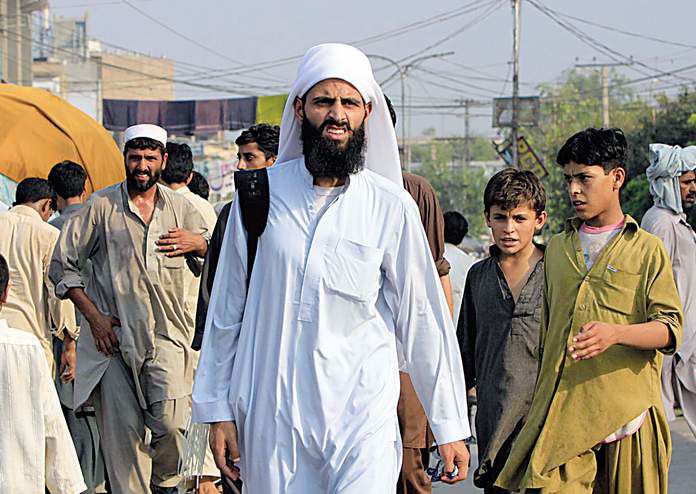Conflicts in Afghanistan, Pakistan have roots in Pashtun ethnic agenda
Published 5:00 am Sunday, August 2, 2009

- Pakistani Pashtuns walk through a market last week in Peshawar, Pakistan. Pashtuns dominate the Taliban, but even tribal members who have not taken up arms dream of a united Pashtunistan, where the borders of Pakistan and Afghanistan meet.
KABUL In a recent debate leading up to the presidential elections here, the first question was not about terrorism, or violence, or even opium. It was about how candidates viewed a jagged line casually drawn on a map 115 years ago by British colonial rulers.
For the West, this border separates Afghanistan from Pakistan, and it is a source of great frustration that neither country seems able or even willing to enforce it. But for many Pashtuns, the most powerful ethnic tribe here, the line runs through what they call Pashtunistan, and is no more legitimate than the border that once divided East and West Germany.
The Pashtuns and their ethnic agenda are in many ways at the center of the upcoming elections and the armed conflicts in both Afghanistan and Pakistan. Like the Pashtun-dominated Taliban, many Pashtuns who have not taken up arms still share the dream of a united Pashtunistan. This dream grows stronger as the Pashtuns on both sides of the border get more disgruntled.
If the Pashtuns vote in large numbers in the Aug. 20 election, it will help current president Hamid Karzai, a Pashtun. If their turnout is low, possibly because of violence or Taliban threats, his rival, former Foreign Minister Abdullah Abdullah, stands a better chance. Although half-Pashtun, Abdullah is identified with the ethnic Tajiks, and some analysts are concerned that Pashtuns would not accept his victory.
Heart of insurgency
Pashtuns are critical to the Afghan election, says Hassan Abbas, research fellow at Harvard Universitys Belfer Center for Science and International Affairs. Pashtuns are at the heart of insurgency in both Pakistan and Afghanistan because they have been used and abused in the last three decades by regional as well as international players. Their social fabric has been torn to smithereens, and their tribal ethos has been under severe stress and strain due to the rise of fanatical religious elements. Pashtuns today are a victim of circumstances.
The Pashtuns number about 42 million people 42 percent of the population of Afghanistan and 15 percent in Pakistan. They support and, indeed, largely make up the Taliban.
Pashtuns on both sides of the border are feeling that all the world is against them, says Moabullah, a burly 6-foot bearded Pashtun.
From a pocket inside his dark brown vest, Moabullah pulls out an election registration card. He laughs. It shows his picture and identifies his father, his district, his village, but it does not say that he is Taliban.
Moabullah got the registration card when he marked his ballot in Afghanistans 2004 presidential elections. He wont be voting this time around. Instead, Moabullah uses the card to slip safely through government-run checkposts. If I get stopped outside my area, on the highway, I show this card.
When the Taliban ruled Afghanistan, Moabullah was a reluctant fighter, who says he often hid to avoid being sent to the northern front lines. In 2001, when the Taliban were routed, Moabullah returned to his home in Ghazni, south of the Afghan capital. He even sought international money to build some wells and irrigation ditches in his district.
He says he didnt get any. He says the victors mostly non-Pashtuns of the Northern Alliance, dominated by ethnic Tajiks and Uzbeks hounded him, demanding weapons and money, with threats to turn him over to their U.S. allies as a Taliban unless he capitulated.
Eventually he fled to Iran.
In 2007, he came home and returned to the Taliban.
All one tribe
The people were suffering. Pashtuns were feeling their life was tough, he says. Slowly, slowly Mullah Omar began organizing and we all went back. … We are one tribe in Pakistan and Afghanistan. There is no difference. We are the same culture, the same turban, the same language. Our people are coming and going. Pashtuns on both sides of the border have to help Taliban.
Moabullahs story reflects the resentment that many Pashtuns feel, which makes them all the more open to the Taliban.
In Pakistans northwest, Pashtun tribesmen are still bristling at the Pakistani militarys incursion into their tribal areas, starting in 2003. Since then they have killed 1,800 Pakistani soldiers. President Pervez Musharraf tried to make peace with them in 2006 but failed.
Under the banner of fighting for Shariat or Islamic law, the Taliban is sweeping through Pakistans frontier, offering an alternative to a weak state that has been stingy with amenities. Electricity is sporadic, and the literacy rate is about 10 percent among men and less than 2 percent among women, say local politicians.
Hamid Gailani, deputy head of the Afghan Senate and a member of one of Afghanistans revered religious families, says: Taliban are advancing because of frustration with the situation.






